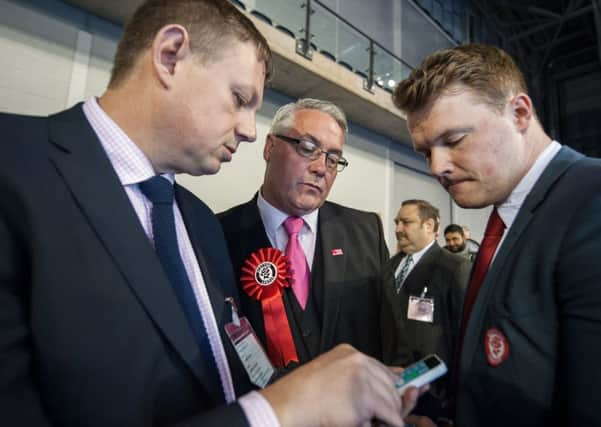Stalemate shows constitution still divides electorate


The SNP comfortably took most seats, with their 431 councillors up by six from 2012. But the Conservatives firmly established themselves as the main challengers to Nicola Sturgeon’s party in local authorities after sweeping gains, including in many areas previously seen as “no-go” for the Tories.
It was a miserable result for Labour as the party was pushed into third place again by the Tories after widespread losses. Labour was 14 seats behind the Conservatives, although Kezia Dugdale’s party came out on top in many seats around the country.
Advertisement
Hide AdAdvertisement
Hide AdThe proportional representational system of voting that determines council ballots in Scotland means no party secured majority control in any of the 32 council areas. Horse-trading will begin in the days and weeks ahead to hammer out the coalitions which will form the ruling administrations across Scotland over the next four years.
The SNP’s key target was Glasgow, the last citadel of Labour power in Scotland. This was captured with eight gains to take 39 seats overall, although the nationalists fell short of an overall majority. But the return of seven Greens could pave the way for a comfortable pro-independence coalition controlling Scotland’s biggest city.
It was altogether tighter in Edinburgh, where the SNP’s 19 seats – a loss of two – left the party just one seat ahead of the resurgent Tories. The Labour group in the capital will be king-maker, with 12 seats.
The disappointment in the SNP ranks became evident when it emerged that group leader Frank Ross is to face a leadership challenge from finance convener Alasdair Rankin. Mr Ross recently caused controversy with comments suggesting pro-Union parties only called themselves “Scottish” as a branding exercise to win votes.
And although the SNP ousted Labour in Aberdeen, the nationalists lost their majorities from 2012 in both Dundee and Angus.
The Tories enjoyed major gains, recording their best ever result in Scotland’s council elections since the current system was established 20 years ago.
One of the sweetest victories will have been in Aberdeenshire, the backyard of former SNP leader and first minister Alex Salmond, where there was a massive swing from the nationalists. The Conservatives took 23 seats, two more than the SNP, in a dramatic turnaround from 2012 when the nationalists romped home with 29 seats to the Tories’ 14.
The Conservatives’ success comes a week after Theresa May’s campaign visit to the area, with Aberdeenshire’s Westminster seats firmly within Tory sights. Even Mr Salmond, the MP for Gordon, conceded the Tory vote is “very strong” in the area.
Advertisement
Hide AdAdvertisement
Hide AdIt was a similar story in Perthshire, where the Tories seized 17 seats, two ahead of the SNP, after finishing second to the nationalists in 2012. This doesn’t bode well for the nationalist MP Pete Wishart in Perth and North Perthshire next month.
The nationalists’ Westminster leader Angus Robertson will also be worried after the Tories ended up just one seat behind the SNP’s 10 in Moray.
In all, the Tories became the top party in six council areas.
For Labour, it was a dismal night with the loss of 161 seats from five years ago. The party’s disappointment in Glasgow was compounded by the loss of three other council areas – Renfrewshire, West Dunbartonshire and North Lanarkshire – where it pulled off surprise majority victories in 2012.
Ms Dugdale put it down to the “constitutional bite” taking its toll and there were many areas where the Labour vote held up.
Labour won most seats in East Lothian, with the SNP, victors in 2012, pushed into third. This will boost Labour hopes there next month: it is confident of taking the target Westminster seat from nationalist George Kerevan, who won in 2015.
Labour also gained Midlothian from the SNP, won Inverclyde and tied with the nationalists in North Ayrshire.